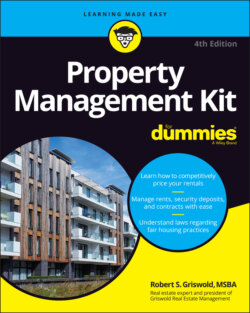Читать книгу Property Management Kit For Dummies - Robert S. Griswold - Страница 54
Eyeing the pros and cons of using a pro
ОглавлениеThe pros of using management firms are many. Namely, these firms
Have the expertise and experience to manage residential rental property.
Stay up to date on federal, state, and local laws — plus such liability issues as mold and fair-housing policies — so you don’t have to.
Are fair, firm, and friendly with tenants.
Have screening procedures and typically can evaluate potential tenants more objectively than you can.
Handle property management issues throughout the day and have staffing for after-hour emergencies.
Have contacts and preferential pricing with many qualified, licensed, and insured suppliers and vendors who can get work done quickly and efficiently.
Handle all bookkeeping, including rent collection.
Have well-established rent collection policies and procedures to follow when tenants’ rent is late.
Have an online presence, with websites that provide detailed information and photos of all their available rental properties.
Handle all aspects of hiring employees so you don’t have to process time sheets, calculate and submit payroll, generate paychecks, or oversee all the legal requirements that come from having employees.
Can be excellent sources for purchasing additional income properties because they’re often the first to know when their current clients want to sell.
Management companies have numerous downsides as well, of course:
Using a management company for small residential rental properties that you’ve recently acquired may not be cost-effective because the management fees can run up to 10 percent or more of your gross income, including leasing fees.
Some smaller companies may not be technologically advanced and aren’t able to offer the variety of online services that tenants expect, such as rental applications to prospective tenants, electronic rent payments, and maintenance requests for current tenants. (Many companies now have property management software that provides an online portal where tenants can access a wide variety of services and information.)
Some companies have in-house maintenance personnel or affiliated contractors or vendors that charge markups or surcharges on supplies and materials, as well as increased labor costs. For some management companies, these hidden profit centers are highly lucrative. They will lowball the property management fee just so they can add more clients (especially owners with older properties) and then perform expensive maintenance and repairs, which is where they make their money.
They often don’t have the same care, consideration, and concern for the rental property that you have. You need to contact their current clients to make sure that your proposed property management company has an established track record of treating tenants with respect and putting their clients’ interests first.
They often charge extra (a leasing fee) to fill vacancies or take longer to fill the spots if they’re dealing with several other vacancies at the same time.
Despite the technological advances that are available with the latest property management software, some companies require tenants to drive to their offices to apply for the rental, to pay rent, or to request maintenance, which can be a disadvantage if the company isn’t located close to the rental property.
They may not be diligent in collecting delinquent rent, particularly if the management contract provides that they keep all late fees and other administrative charges — another hidden profit center for management companies that is not in the best interest of the property owner.
Some companies may try to falsely impress you with low maintenance expenses when they’re not spending enough on repairs and maintenance to maintain the property properly. Every property is unique, and there are no “average maintenance costs,” so don’t be fooled by very low maintenance expenses at a new property when you’re looking for a property manager for the 70-year-old house your grandma left you.
Management companies affiliated with “for sale” real estate brokerages may be more interested in a large real estate commission from a sale and may not provide the best property management services. The majority of property-management lawsuits I have seen are against major real estate brokerages that primarily make money representing clients who are buying and selling real estate but want to keep a relationship with the homeowner (with the goal of a future sales commission) by having an inexperienced and unqualified person offer property management services. Look for a management company that only manages property; then use a real estate brokerage firm that specializes in real estate sales to help you with your next purchase or sale.
